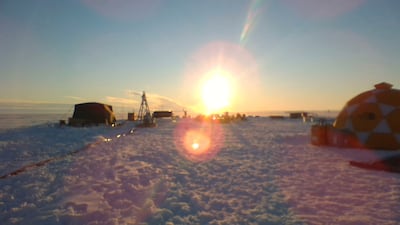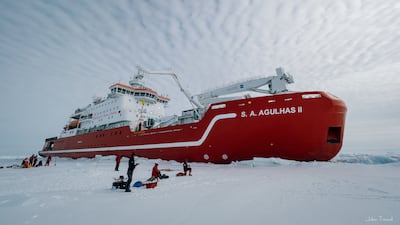The Earth’s polar regions could become conflict zones as climate change opens them up to mining and militarisation, experts fear.
A complete ban on mining in Antarctica is due to expire in 2048 — by which time resources on other continents may be becoming scarce. Global warming could also make the continent's water a valuable commodity.
Although there is uncertainty about what lies beneath the ice, there are estimates that the southern continent could hold billions of barrels’ worth of oil and gas reserves.
In addition, Antarctica’s ice sheet is believed to hold between 70 and 90 per cent of the planet’s fresh water. Rising temperatures have already caused one glacier alone to lose a trillion tonnes of ice.
Laura Birkman, a security analyst at the Hague Centre for Strategic Studies, said these mineral attractions could make Antarctica a “major political hotbed” in the future.
By the time the mining ban comes up for discussion in 2048, fresh water could be “even more highly sought after as a result of further climate-induced water scarcity,” she said.
Speaking on an International Institute for Strategic Studies panel, she said the date was also significant because China’s rulers would be seeking material prosperity when they celebrate 100 years in power the following year.
“It will be potentially a critical year for the Chinese Communist Party in its efforts to realise its ambition to be one of the world’s most developed and powerful nations by its centenary in 2049,” she said.
The warning comes with experts and diplomats concerned more broadly that climate change will fuel conflicts over resources made increasingly scarce by natural disasters and global warming.

Delegates at last year’s Cop26 climate summit were told by the Nato secretary general and other top officials that environmental and security issues were two sides of the same coin.
Germany, which holds the G7 presidency this year, hopes to tackle some of the issues facing Antarctica at a Berlin conference in May, the 44th regular meeting of parties to the 1959 Antarctic Treaty.
Seven countries have territorial claims in Antarctica — Argentina, Australia, Chile, France, New Zealand, Norway and the UK — but these claims are partially suspended under the 1959 agreement.
A protocol to that treaty, which entered into force in 1998, designates Antarctica as a “natural reserve, devoted to peace and science” and bans mining on the continent.
Although that ban does not automatically expire after 50 years, it can be modified after 2048 by vote of a majority of the treaty’s 29 signatories.
That could open the door to exploration for oil and gas, despite many rich countries targeting 2050 as the date when they will reach net zero greenhouse gas emissions.
The Arctic could provide similar opportunities for oil and gas extraction as ice melts and waterways are opened up.
“Who has the right to control these seaways and benefit from the vast and undiscovered natural resources? This is an evolving geopolitical concern,” said Ms Birkman.
Mark Nevitt, an environmental law expert on the IISS panel, said this posed different questions to the ones commonly raised about security and climate change.
“We always talk about natural resources in the context of developing nations or poor nations. The Arctic is surrounded by very, very wealthy nations,” he said, mentioning, the US, Canada and Nordic countries as examples.
With developed countries potentially at odds, the melting ice caps could “increase the potential for militarisation and weaponisation” in the Arctic, he said.


